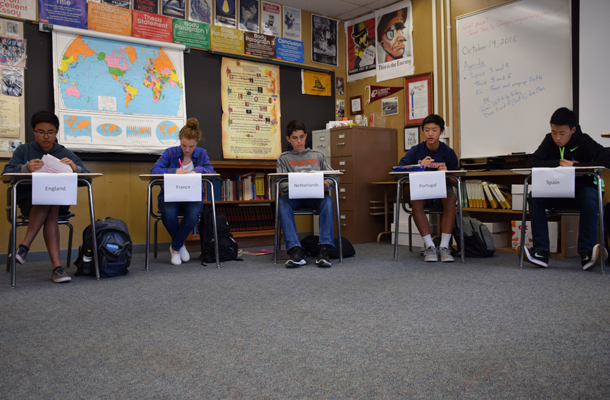Role Play Teaches European History
October 27, 2016
AP European History students, representing their assigned countries, conversed in a panel discussion about each of the five areas of European exploration on October 18-21.
The five assigned countries were Spain, England, Portugal, Netherlands, and France.
Each of the representatives explained one of their country’s commercial motives, political motives, religious motives, navigational advancements, military advancements, relations to the Columbian exchange, and slave trade for exploring the New World around the early 15th century to 17th century. They also engaged in debates over which country was most successful.
Students were encouraged to role play as the representatives of their respective countries, whether it was through wearing their nation’s clothing or speaking passionately. Sophomore Sophie Cortes, representative of England’s commercial motives, used a British accent. “I made it fun, I tried to use an accent that resonated with more people who had paid attention, because you’re doing something different, and so for me doing that, I was able to tie in sort of a fun aspect into it,” she said.
AP Euro teacher, Paul Verbanszky said, “I think the students put in a lot of effort and the majority of them did a nice job taking on the personalities of the delegates from their countries.”
“Everything I talked about was very cause and effect. England’s commercial motives are things we still use today, so the project tied in very much so to all the things we’re doing today,” said Cortese.
Along with the presentation, students were required to write a short summary about their topic for the class to compile into a review packet for the unit of exploration.
“When you have all of your peers writing their own fact sheets, it’s very student thought, so everyone thinks differently than maybe how a teacher would approach something, so when all the students are doing the same thing, then they’re understanding what each of them are saying because they’re all generally at the same thinking level,” said Cortese.
Sophomore Lauren Landry said, “It was very interactive, which was nice and it gave you time to definitely specialize in a certain topic so you can learn specifics about a certain country, instead of general knowledge from the textbook. However, I think the main thing was that people were more using the panel discussion as a time to give a speech instead of actually engaging in conversation, so there could have been more flow or there could have even been a time limit.”
On the final day, the students were required to bring a food item, popular in their country and specific to their era of exploration, to share with the class. For example, students representing England brought scones, representatives from the Netherlands brought gouda cheese, and the French representatives brought baguettes and chocolate.
“I added a food component this year, which I think was a success,” said Verbanszky. “I think that added more fun and a connection to today’s times. And I already have ideas for next year to make it even more exciting.”

